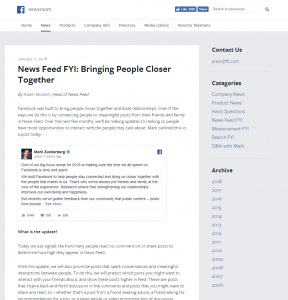A quick history of the Facebook-Friendly Strategy at Facebook
Facebook has broken the discourse for billions of people with its content-feeding algorithm informed by sophisticated analytics and behavioral psychology.
First, Facebook turned “friend” into a verb, a goal in itself, as we were all pushed a decade ago “to friend” as many people as possible, going well above the 150-Dunbar number. If you’ve never purged your “friend” list, chances are you still have several hundreds of them in your Facebook account.
 Do we need hundreds of friends?
Do we need hundreds of friends?
Did we need to reconnect with old neighbors, high school frenemies or past flames?
Not really. Facebook did.
It did, so the social network (which was the preferred name before the switch to social media – an interesting semantic change actually) could become as big as it is today.
Then, Facebook opened up to brands, organizations and schools. It also started to make it against the rule to use a profile for anything but an individual. Some schools had already created profiles for their different units, mascots and whatnot, but they had to transition to this new order – or face possible extinction. Facebook helped in the early days make the transition easier transferring friends to the newly created pages. The social media platform put order in its user base by categorizing, so it could better discriminate between users with and without an advertising budget.
From social network to social media, the stage was set to get ready for the ad-based future business model.
The next step in Facebook’s strategy was to convince and cajole all these organizations with large established networks they absolutely needed a Facebook page where they could reach for free and very organically all the members of their network.
This was the time where everybody – network news channels, newspapers, big brands, schools, universities, non-profit organizations as well as small businesses – invested time and money to ask us to like them on Facebook and grow Facebook’s reach as a result (free promotion campaign!).
Everybody wants to be liked – even if it’s only on Facebook, right?
Once the social media platform reached a critical mass in term of users, a big enough audience to start selling ad impressions, it introduced social media ads.
Newsfeed and algorithm: Facebook solutions to user problems created by being too Facebook-centric
The Facebook news feed started to broadcast each of our updates to all the strangers we previously friended. It became this unique space where everybody could go to drink all the new “news updates” now trickling down to this water hole.
Yet, with the size of our personal “friend network,” this water hole became a firehose of updates nobody could keep up with. In our rush to friend as many strangers as possible, we helped make it impossible to manage the resulting flow of “news.”
The answer to this problem Facebook had created in the first place became the news feed algorithm and the end of the unfiltered feed where we could see every update in reverse chronological order.
It was important to make room for our sanity by providing a manageable user experience.
So, Facebook had to reintroduce the filtering middle man the desintermediation movement had toppled down and rendered obsolete.
Yet, instead of bringing back authoritative or journalistic filters, Facebook chose the algorithmic filter designed and developed by usage data. The truth could only be in the data, right?
Moreover, the algorithm as filter had a big advantage: it would easily – and not very transparently – help optimize, at scale, for Facebook’s conversion goal of the moment.
When digital advertisers started to move away from reach and impressions to measure the return on investment of their ads and started to demand engagement, Facebook just had to push us all to like and share.
Commenting, because it took too much time, wasn’t an optimization priority yet back then. Quantity was much more important than quality to show advertisers the impact of social media to engage millions of people.
We have now all be turned into robots reacting with a finger tap to the Facebook updates that trigger the most our emotions as we mindlessly scroll down our endless social media feeds.
Going back to the good old days to heal Facebook wounded ego – and business model?
Fortunately, more and more voices have started to question the role of social media platforms in the return of the age of propaganda.
The inquiry around the intervention of Russian interests in the last presidential campaign has given Silicon Valley a bad aftertaste over the last few months as the World starts to doubt its motives.
 The subsequent Facebook soul-searching Mark Zuckenberg has done at the end of last year should be seen in this context of growing – and dangerous for the survival of the business – public criticism.
The subsequent Facebook soul-searching Mark Zuckenberg has done at the end of last year should be seen in this context of growing – and dangerous for the survival of the business – public criticism.
If you look at the recent announcement about the end of organic distribution for Pages in this context, Facebook’s decision makes a lot of sense.
Facebook wants to go back to its roots by renewing with conversations among friends or strangers sharing a common interest, so it can save itself, its revenues and its profit.
If users start loathing their time on Facebook too much, they will spend less and less time on it. A decrease in users would have a direct impact on advertising revenues. Ultimately, this could mean the end of the business model. Period.
Facebook has always wanted to be “our Everything,” the place where we keep up with friends, the place where we share our photos or videos, the place where we sell our used stuff, the place where we get our news (and this is the case for 50% of the American adult population online) and the place where we see ads to buy more stuff.
Facebook still thinks it knows better what we want to see, what we want to buy, with whom we want to stay in touch or reconnect.
Facebook is obsessed by Facebook and, deep down, wants to be our only friend, the middle man powering, enabling but also filtering and controlling our digital lives.
Our relation to Facebook is complicated as it can give us so much and take too much at the same time. If it were a person of flesh and blood, Facebook could be your next highly functioning sociopath.
Facebook thinks it’s your Mom, but acts like Big Brother
The core problem with Facebook is that it thinks it knows better.
Well, it’s definitely not our Mom – even though it’s behaving more and more like Big Brother, watching – and trying to program – our every digital move.
Predicting human irrationality is tough. And, I’d argue that Facebook algorithm knows even less, because it only relies on limited trigger data points.
As irrational humans, we need a fine balance of new, popular, nostalgic, heartwarming – and even a dash of outrageous – to stay engage on the long term. The balance is the key – not the ingredients.
Unless they don’t work hard to crack the code of this balance, I don’t see how any social media feed change will fix what Facebook and the other big tech companies have broken over the past few years.
So, where does this leave us?
How can we maintain a relationship with Facebook to take advantage of the good without putting ourselves too much at risk when it becomes abusive again and decides its needs are above everybody else’s?
What to do next? Plan for the next change and balance your social media portfolio
While difficult and potentially time-consuming, diversification is key to protect your brand online as well as your digital assets.
It’s crucial to balance your portfolio when it comes to social media as it is for marketing in general.

A well-orchestrated multiplatform strategy is key, because options mean… options!
Don’t put all your eggs in the same basket, because depending on a monopoly could cut you off from your audiences.
But, you have so little time and so few resources…
True. That’s the reason why it’s important to stop being so much reactive and start to be more strategic. And, by strategic, I don’t mean devise a tactical plan to spark Facebook comments with your posts.
Beyond the new engagement tactics focusing on live videos and posts sparkling long comments, it’s important to reassess your global social media portfolio in the context of all your digital channels.
We have become used to create crisis communication plans in higher education in the event of a weather emergency (snow days, hurricanes, etc.) or, even worse, an active shooter scenario on campus, so why not work on a crisis plan in case you lose Facebook or Instagram overnight?
This happened to the University of Guelph just last January when Facebook closed their Mascot’s 8-year old profile. And, it was a nightmare at first as this happened in the middle of the recruitment season. So, it’s not exactly science-fiction.
 How would you stay visible if other social media platforms (Instagram comes to mind) decided to end organic overnight?
How would you stay visible if other social media platforms (Instagram comes to mind) decided to end organic overnight?
Would you need anything else to engage your prospective students if organic social media were to disappear altogether?
Do you have alternate communication channels to reach and engage your current students or your alums?
Do you need to provision some budget for social media advertising – just in case?
Adapting to the latest version of the social media algorithm is important short term, but it’s crucial to be prepared – and have alternative solutions – in case of a more dramatic change.
So, what would you? What will you?
Meet the Faculty: Karine Joly
Higher Ed Experts is a professional online school for digital professionals working in universities and colleges.
When you take a professional certificate course with us, you get a chance to upgrade your skills by working on your projects, interacting with classmates just like you and getting detailed personalized feedback from your instructor.
 Karine Joly founded Higher Ed Experts in April 2007 and teaches Higher Ed Expert’s 8-week online course on Social Media Marketing for Higher Education.
Karine Joly founded Higher Ed Experts in April 2007 and teaches Higher Ed Expert’s 8-week online course on Social Media Marketing for Higher Education.
She oversee the development of the professional development curriculum for the school. She shares her insights about emerging web and social media trends on collegewebeditor.com, a popular and independent blog launched in February 2005. She also authors the Internet Technologies column for University Business. Karine has presented on social media marketing, web analytics and online courses at leading higher ed conferences (CASE, American Marketing Association, EduComm, eduWeb, CUPRAP, HighEdWeb, PSEweb, UB Tech, etc.).
Tags: Higher Ed Experts Faculty, Higher Ed News, Karine Joly